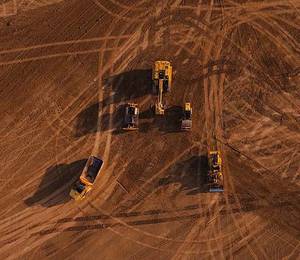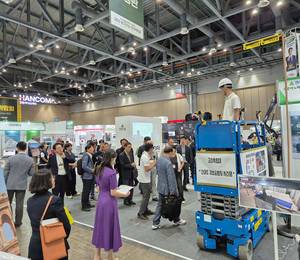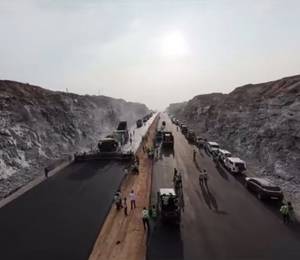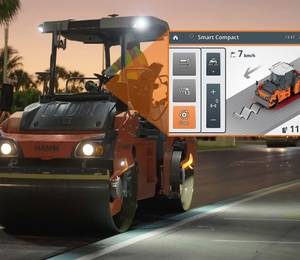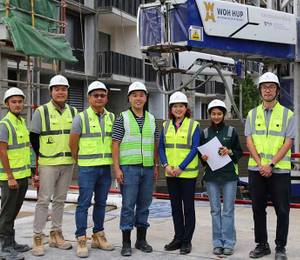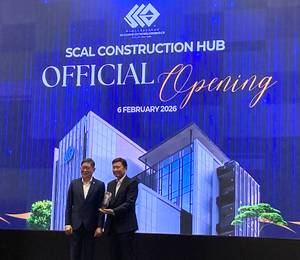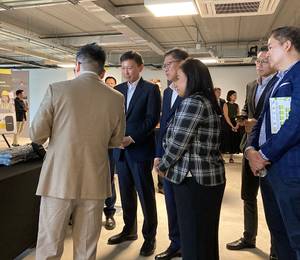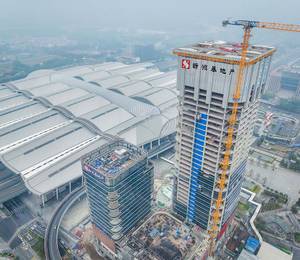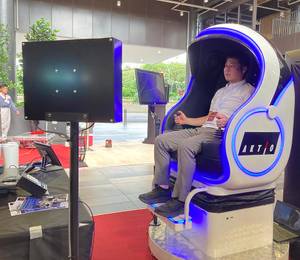“The construction of tomorrow is not just about building efficiently. We must also study and explore new methods of construction that allow our construction industry to build more sustainably,” said Singapore’s Minister for National Development Desmond Lee at the opening of the 47th International Federation of Asian and Western Pacific Contractors’ Associations (IFAWPCA) Convention, as he addressed the theme of the event.
This year’s IFAWPCA Convention took place on 7-11 April at the Sands Expo and Convention Centre, Singapore, hosted by the Singapore Contractors Association Limited (SCAL) for the first time in two decades. Themed’ ‘Embracing Construction of Tomorrow’, it brought together construction professionals, business leaders and government officials from across Asia and Western Pacific. [Scroll down to watch a short video of the event].
IFAWPCA consists of 17 member countries and regions: Singapore, Malaysia, Philippines, Indonesia, Cambodia, Thailand, Hong Kong, Taiwan, Nepal, India, Sri Lanka, Bangladesh, Bhutan, Korea, Japan, Mongolia and Maldives. The previous edition of IFAWPCA Convention was held in Kathmandu, Nepal in November 2023.
“Asia and Western Pacific are homes to some of the most dynamic and fast-growing economies in the world. These nations are expected to drive the global construction market in the coming decades. However, with growth comes responsibility,” highlighted Kenneth Loo, president of IFAWPCA.
“We must build not only for today’s needs, but the challenges of tomorrow. The buildings and infrastructure and urban landscape we create today will shape the lives of millions for generations to come.”
A two-day forum (conference) and exhibition was held on 9-10 April as part of the event. The forum gathered industry experts to discuss important topics under four sessions: Urban Resilience and Coastal Protection, Transforming Construction through Technology, Sustainability in Construction, and Singapore and International Business Forum. The exhibition showcased a variety of solutions targeted at the construction industry in the region, such as energy-efficient equipment and machines, sustainable construction materials, advanced digital tools, and robotic technologies.
In addition, delegates had the opportunity to participate in a technical site visit. They could go to either Samwoh Smart Hub, a Housing & Development Board (HDB) project, or Teambuild’s Integrated Construction and Prefabrication Hub (ICPH).
‘Doing more with less’
Speaking of Singapore’s experience, Mr Lee explained how the country has to make the most of its limited resources. “We achieve this by shifting towards advanced construction methods and facilities that are more land-efficient, productive and sustainable,” he said.
“First, by adopting design for manufacturing and assembly (DfMA).” With this method, components can be produced off-site in a controlled environment, which “allows us to build better, safer, and with less reliance on manual labour.
“Second, the adoption of robotics and automation (R&A). Last year, around 20 different robotic solutions were deployed at over 50 construction projects – for wall skimming and painting, drilling and anchoring, tile grouting, and other finishing works that are typically labour intensive.
“Third, transforming our construction facilities. For our concreting and precasting needs, we first moved from precasting in large open precast yards that required a lot of land, to Integrated Construction and Prefabrication Hubs (ICPHs), which are automated, multi-storey facilities that take up less land.”
“We recently took this a step further,” he continued, “by bringing together and co-locating different construction facilities. Singapore launched its first Integrated Construction Park (ICP) last year, located at Jurong Port. “Not only is this more land-efficient, but it also saves transportation time, and reduces the carbon footprint from truck trips across Singapore.”
“From reclaiming land and developing underground spaces, building vertically and embracing green infrastructure, Singapore’s approach has always been about doing more with less,” added Mr Loo, who is also executive director and chief operating officer of Singapore-based Straits Construction.
The opening ceremony was followed by the first General Assembly, where IFAWPCA members each gave an update on their country’s industry developments, key projects, main challenges and how they tackle the issues.
Tan Chee Kiat, deputy CEO (industry development) at Singapore’s Building and Construction Authority (BCA), delivered the keynote address at the start of the forum. He looked at trends and opportunities in the local built environment sector, highlighting the Built Environment Industry Transformation Map (BE ITM) developed to help the sector meet future needs.
Adapting to climate change and building sustainably
In recent years, governments and industries around the world have been stepping up their sustainability commitments and taking various actions to mitigate the impacts of climate change.
“As a low-lying island, climate change and rising sea levels are existential threats to Singapore. We also have limited alternative energy sources, given our land and resource constraints. Hence, sustainability is not a choice for us. It is an absolute necessity,” stressed Mr Lee.
“With buildings accounting for over 20% of Singapore’s carbon emissions, a key effort is making our buildings greener, smarter and more energy efficient. Our plans to do so are captured in the Singapore Green Building Master Plan, which serves as a guiding document for decarbonising our built environment sector.”
Mr Lee shared some of Singapore’s key targets and efforts towards improving energy efficiency in buildings. “This push for energy efficiency also extends to the construction of the buildings,” he added. “We want to make the construction process more sustainable, and encourage firms to adopt greener practices.” An example of this is the provision of Energy Efficiency Grant (EEG), whereby the government co-funds investments in energy-efficient equipment.
James Lam, executive director, coastal engineering & management at Surbana Jurong Consultants, discussed a planning framework for coastal communities adapting to rising seas and extreme weather. He explained how vulnerable the region is to these climate change effects and the available solutions to overcome the challenges. Meanwhile, Professor Koh Chan Ghee from the Department of Civil and Environmental Engineering at National University of Singapore provided insights into research and innovation for coastal protection.
Hidetsugu Matsumoto, executive officer, executive of international business unit (civil engineering) at Penta-Ocean Construction, a Japanese contractor specialising in port and coastal projects, talked about measures against climate change in Japan as well as innovative technologies and solutions that the company has developed for marine construction.
In the ‘Sustainability in Construction ‘session, Yong Jian Rong, chief operating officer of Woh Hup, a Singapore-based contractor, outlined the company’s strategies in reducing carbon footprint, minimising waste and improving energy efficiency. Other speakers included: Lydia Goh, senior manager, engineering environmental sustainability at Changi Airport Group, on ‘Developing Green Airport of Tomorrow’; and Calvin Chung, assistant chief executive officer, engineering & operations at JTC Corporation, on ‘JTC’s Integrated Approach to Build a Sustainable Industrial Future.’
Transforming construction through technology
This session explored how digitalisation and technological innovations have reshaped the construction industry. Muhammad Khalil Bin Shaiful Bahari, senior vice president – group technology office at Boustead Projects, highlighted the benefits of integrated digital delivery to drive innovation and transformation.
“An integrated digital delivery (IDD) framework enhances the efficiency, collaboration and accuracy of construction projects by integrating digital technologies throughout the project lifecycle,” he said. “Open communication is vital for successful BIM process, to ensure efficient and seamless information flow from design to construction and ultimately to handover.”
Allan Low, deputy QEHS director at Teambuild Engineering & Construction, shared the company’s key strategic approach and journey towards a ‘smart’ worksite. The use of digital technologies also leads to a safer workplace.
He underlined the main success factors for Teambuild. “First, management support is very crucial for any successful organisation. This is achieved with top management commitment, a clear sense of direction and resources.”
The second is that “no matter how well a system is designed, the only way to bring it to a higher level of success is through positive leadership with continual driving force,” asserted Mr Low, adding that keeping a positive mindset and attitude is another factor.
He further mentioned that the team’s agility is also “crucial due to the fast-pace evolution of digitalisation. We must have the ability to adapt to changes in order to stay relevant.” Finally, it is important to “inculcate a culture of technology. Start small and keep moving forward.”
Date Kensuke, general manager of Kajima Technical Research Institute Singapore (KaTRIS) at Kajima Corporation, spoke on the significance of research-based solutions for real-world applications in construction to meet the challenges of tomorrow.
KaTRIS, a research innovation hub at the GEAR (Kajima lab for global engineering, architecture and real estate), covers a wide range of research areas related to the built environment sector.
International collaboration opportunities
During the international business forum, Ganang Alfanto, vice president, business development & portfolio management division at PT Hutama Karya (Persero), presented an overview of Indonesian construction market. He also outlined the public-private partnership (PPP) scheme in the country, along with various PPP projects in which the company is involved. As one of Indonesia’s state-owned enterprises, Hutama Karya welcomes potential partners to collaborate on its projects.
Piyadit Chai Atsavasirisuk, vice president of the Thai Contractors Association, provided insights into Thailand’s construction industry landscape and major projects in the country. He pointed out three main areas in infrastructure development: transportation, digital, and tourism and entertainment.
Tan Siok Kheng, senior director, physical planning at Urban Redevelopment Authority (URA), talked about Singapore’s strategies for land use planning to build liveable homes and a sustainable city. URA is currently working to prepare the Draft Master Plan 2025 that will guide the country’s development over the next 10-15 years. Ms Tan also revealed a number of long-term urban transformation projects that Singapore can look forward to.
The second part of the session was the Singapore Business Forum, which aims to bring together collaboration beyond Singapore. Among the speakers was John Tan, director (corporate) at BCA International. He explored Singapore’s built environment transformation efforts and international collaboration opportunities, focusing on long-term strategic partnerships to help stakeholders ‘Build Greener, Build Faster, Build Better’.
“We showcase Singapore’s built environment capabilities to the world, and act a reliable partner in supporting key overseas stakeholders’ development goals with Singapore’s best practices and niche built environment solutions,” said Mr Tan.
Er. Kulandaivelu Muthu Kumar, consultant at CPG Corporation, shared the company’s precast construction methods and case studies, comprising prefabricated prefinished volumetric construction (PPVC), hybrid CREE timber – precast concrete system, lotus root precast beam and column system, double-tee slab and precast half shell system, and precast mechanical connections.
Other speakers included: Senthil Thingular Subramaniam, head of operations at Robin Village Development, on ‘PPVC Adoption & Benefits’; Pavithra Venkatesan, executive director of Tech Onshore MEP Prefabricators (TOM), on ‘Prefab MEP Innovations and Solutions’; and Ji Su Jian, director and partner of BuildQAS Consulting, on ‘Construction Quality KPI: Do you need it for your building project?’
The next IFAWPCA Convention will take place in Thailand in November 2026, hosted by the Thai Contractors Association.
